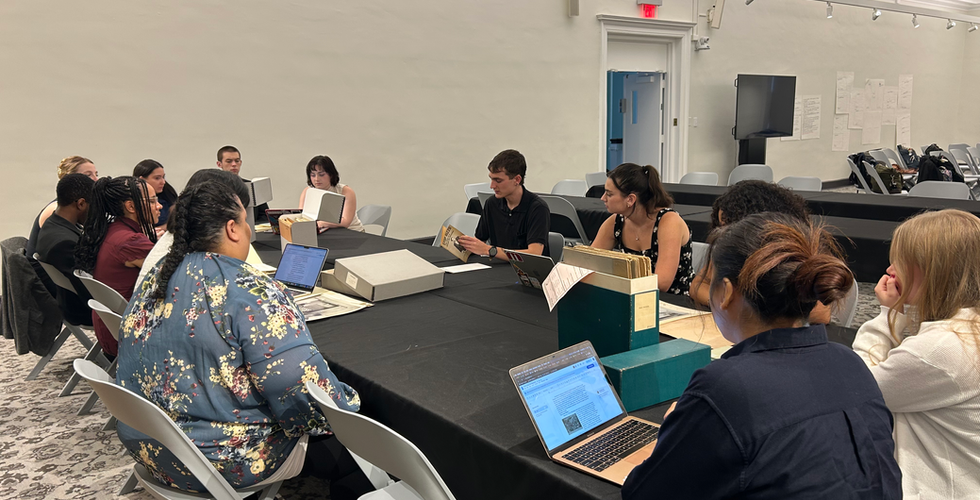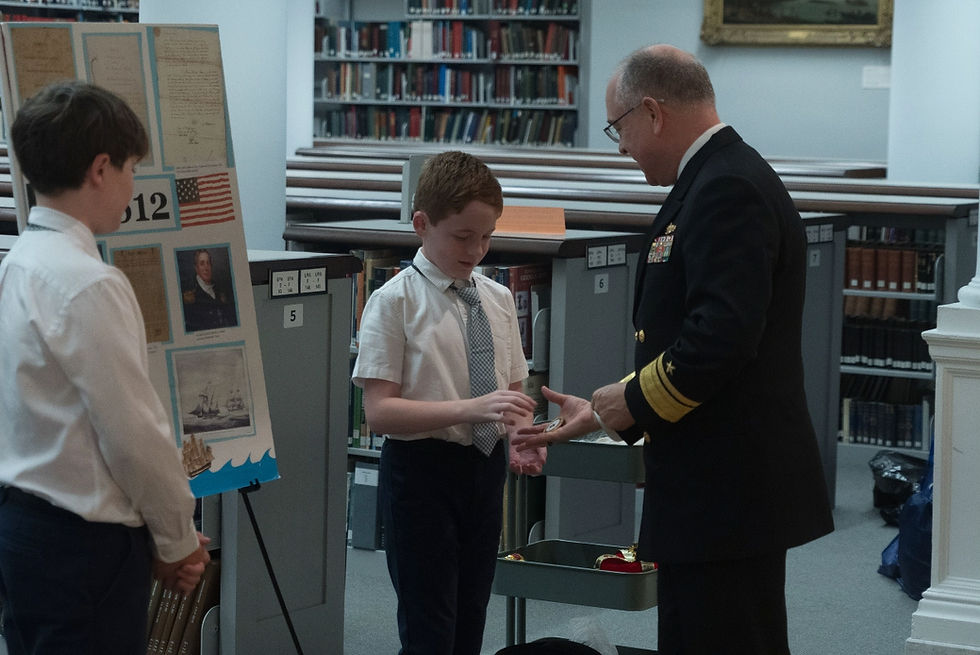HSP Hosts 2025 Public History Summer Academy
- Aug 25, 2025
- 4 min read
Updated: Sep 5, 2025
By Brianna Quade, Community Engagement Coordinator

On August 15, HSP concluded our second-ever Public History Summer Academy. We welcomed 13 undergraduate students from local universities, including Temple University, La Salle University, Rowan University, Penn State University, Villanova University, and St. Joseph's University to HSP for two weeks. This cohort of undergraduate students engaged in archives-based public history research and learned from several community partners about the practice of public history. As HSP's Community Engagement Coordinator, I had the pleasure of developing this year's program and welcoming the cohort to HSP. Check out some of the highlights below!
The program kicked off with a visit by professional genealogist Shamele Jordon who spoke on the use of archival sources in genealogical research. That same day, the students also toured Philadelphia's City Hall and met with city councilmembers.
Photographs courtesy of James Izlar

Throughout the academy, the undergraduates learned from HSP staff about careers in history. Various members of our staff spoke to the students about how public history applies in their roles. Representatives from HSP's development and library departments shared how they interact with patrons and researchers. In their sessions, the students encountered the question "Who is the public?" and learned that ultimately, audiences vary for each staff member based on their role.

The cohort also toured HSP's conservation lab with Director of Conservation and Preservation Services Tara O'Brien. She taught them about the processes behind repairing and conserving the collections at HSP.
The first week of the academy concluded with two offsite visits, first to the Marian Anderson House and then to Mother Bethel African Methodist Episcopal Church.
During the second week, students continued their intensive project research, toured the Museum of the American Revolution, and heard from a range of speakers and community partners, including Hanna Stark of the Preservation Alliance, Jas Fossett, a Summer Academy alum, historical consultant Dr. Cheryl Gooch, Richard White of the Black Docents Collective, Faye Anderson, Director of All That Philly Jazz, and Stefan Johnson, Deputy CFO of City Council.
One of the highlights of the academy was a joint session with students participating in the Museum of the American Revolution’s Living History Youth Summer Institute (LHYSI), managed by Mike Idriss, Manager of the African American Interpretive Program. Both groups explored documents from the Chew Papers (Coll. #2050) and, perhaps most importantly, shared what they had learned over the course of their respective programs. While HSP’s program emphasized archival research and LHYSI focused on historical interpretation, it was a valuable experience to witness the synergy between the groups as they developed strategies for presenting history to the public and grappling with difficult aspects of the past.
As the organizer of Summer Academy, one key takeaway for me, listening to these future historians and scholars, was that the students understood the importance of being passionate about their work. It is our responsibility to tell and interpret sensitive history accurately, and leading with passion can allow the public to understand the importance and value of why history matters.
The academy concluded with students presentations featuring a broad selection of topics related to education, transit, City Hall, education, Wanamaker's store, and centennial celebrations. The students all identified subject matter that piqued their research interests— using that passion of theirs to drive their work!
Through their work in the archive, students learned how to request items from the collections, understand where materials are stored, and, most importantly, how to craft a narrative from just a few sources. Rather than fitting the documents to the story, they considered what story they could draw from the documents. It was a joy to watch them develop their critical thinking skills in such a short time.
Photography Courtesy of James Izlar
The development of the program was possible with the help of several summer interns in the Learning and Engagement department. Campbell Adams shared, "I helped to develop aspects of Summer Academy’s introductory research instruction. I and other interns worked with Brianna to come up with clear definitions of terms relating to historical research and library and archival work. I also created a short guide to assist students in navigating HSP’s digital catalogue, Discover. I was excited to get back into the stacks for my other work for Summer Academy, which consisted of finding interesting documents for students to learn how to analyze primary sources and beginning to think about what project they wanted to delve deeper into. I mainly searched through the Harold E. Cox Transportation Collection (coll. no. 3158) for items on the 1910 PRT trolley worker strike. I had worked with the collection previously for a college course and I enjoyed getting to read the documents again with a new goal. I selected certain sections from a scrapbook with hundreds of Philadelphia newspaper clippings from March 7-12, 1910 which could act as a launchpad for greater discussion among the students. When I later helped Brianna during Summer Academy in directing students and assisting them in their work, I was happy to learn that at least one student had taken an interest in Philadelphia transportation history for their final research project!"
Hunter Allan also shared his experience working on the development of Summer Academy, "In the preparations for Summer Academy, I was helping research for the 1926 Sesquicentennial and it was truly eye opening. I find that reading history books can sometimes lack emotion or empathy. It is hard to see the people when only reading about economics or society. Looking at the artifacts from 1926 Sesquicentennial was nothing like that. All of the artifacts had a very human quality that would be impossible to capture in a book on the topic."
While it was sad to see them depart, I am proud of the work the students accomplished and the skills they developed. They shared that history can be both fun (as evidenced below) and accessible, even while engaging in serious, important work. I was especially touched to hear that the program helped demystify communication and networking in our field—they realized that you really can just talk to people, and that people want to talk to you!
Another key takeaway for the group was learning how to conduct research and extract the crucial information needed to tell a compelling story from the documents.

Be on the lookout on our website for their blog posts!
HSP is thankful for the support of Councilmembers Isaiah Thomas and Mark Squilla for their assistance in securing the funding necessary to provide this learning experience for local undergraduate students!





















































Comments